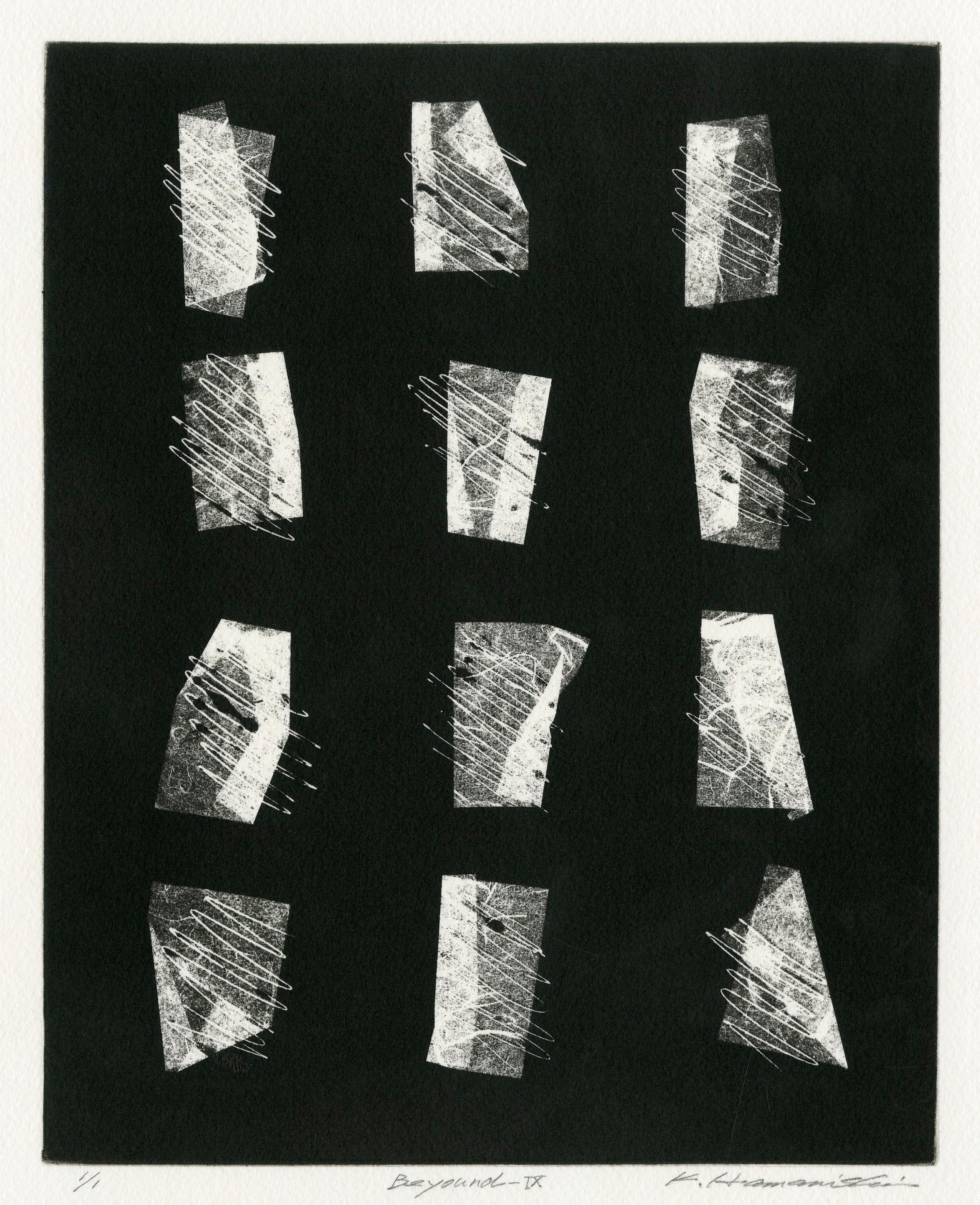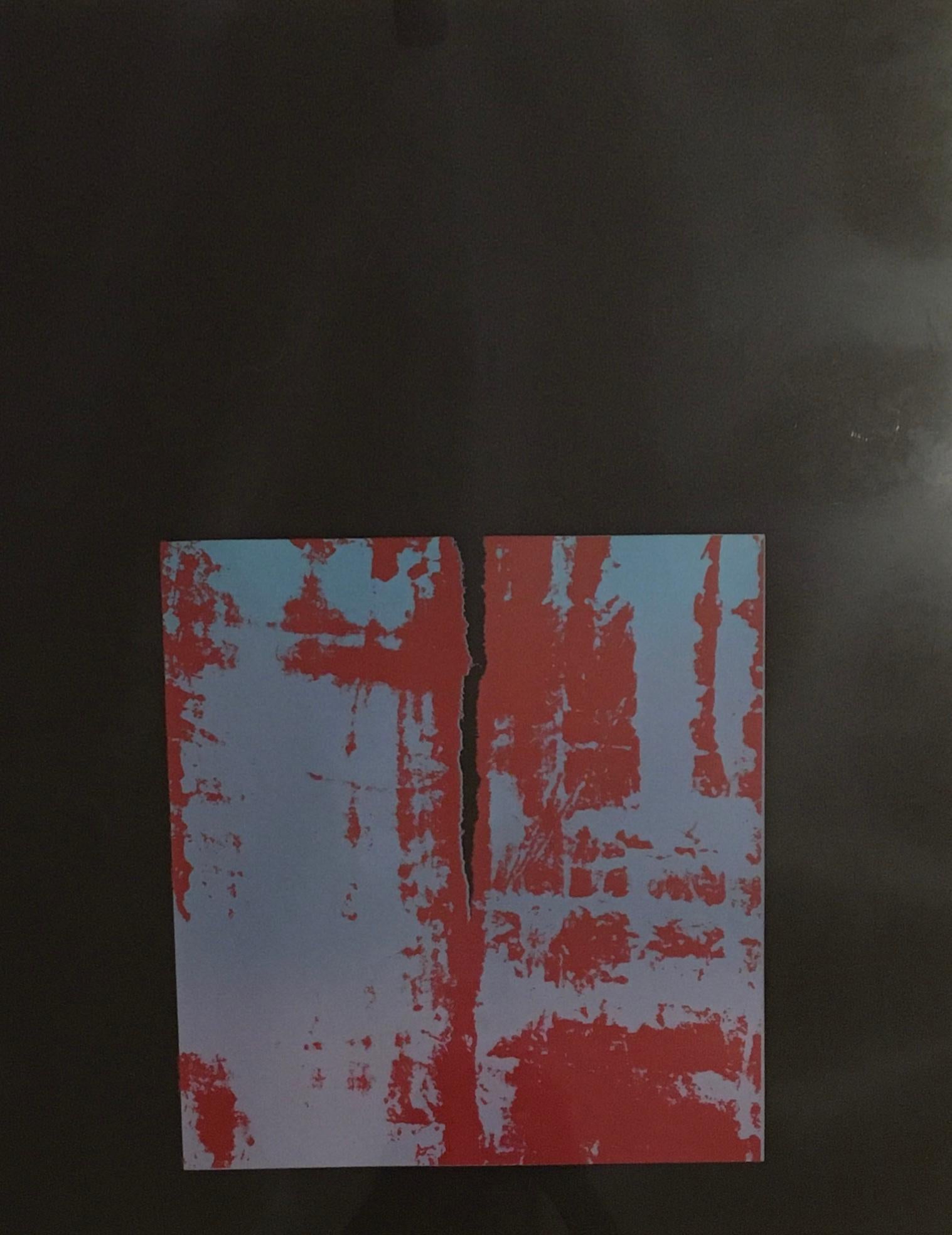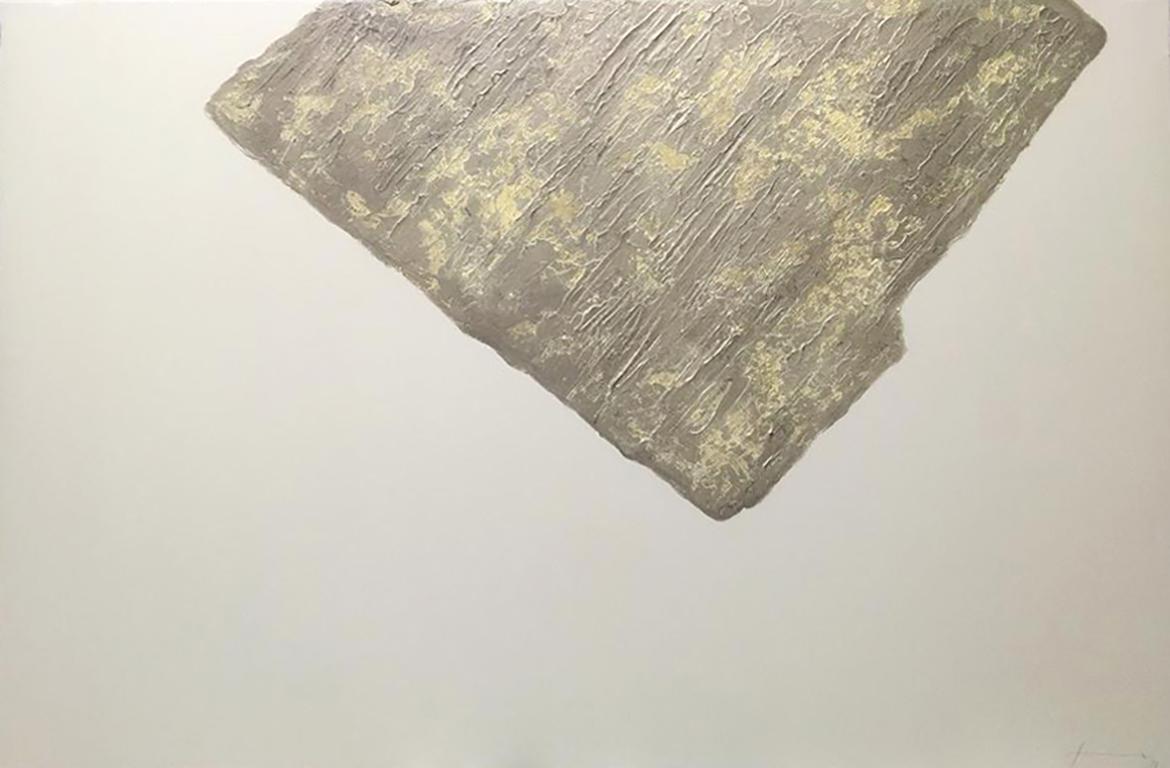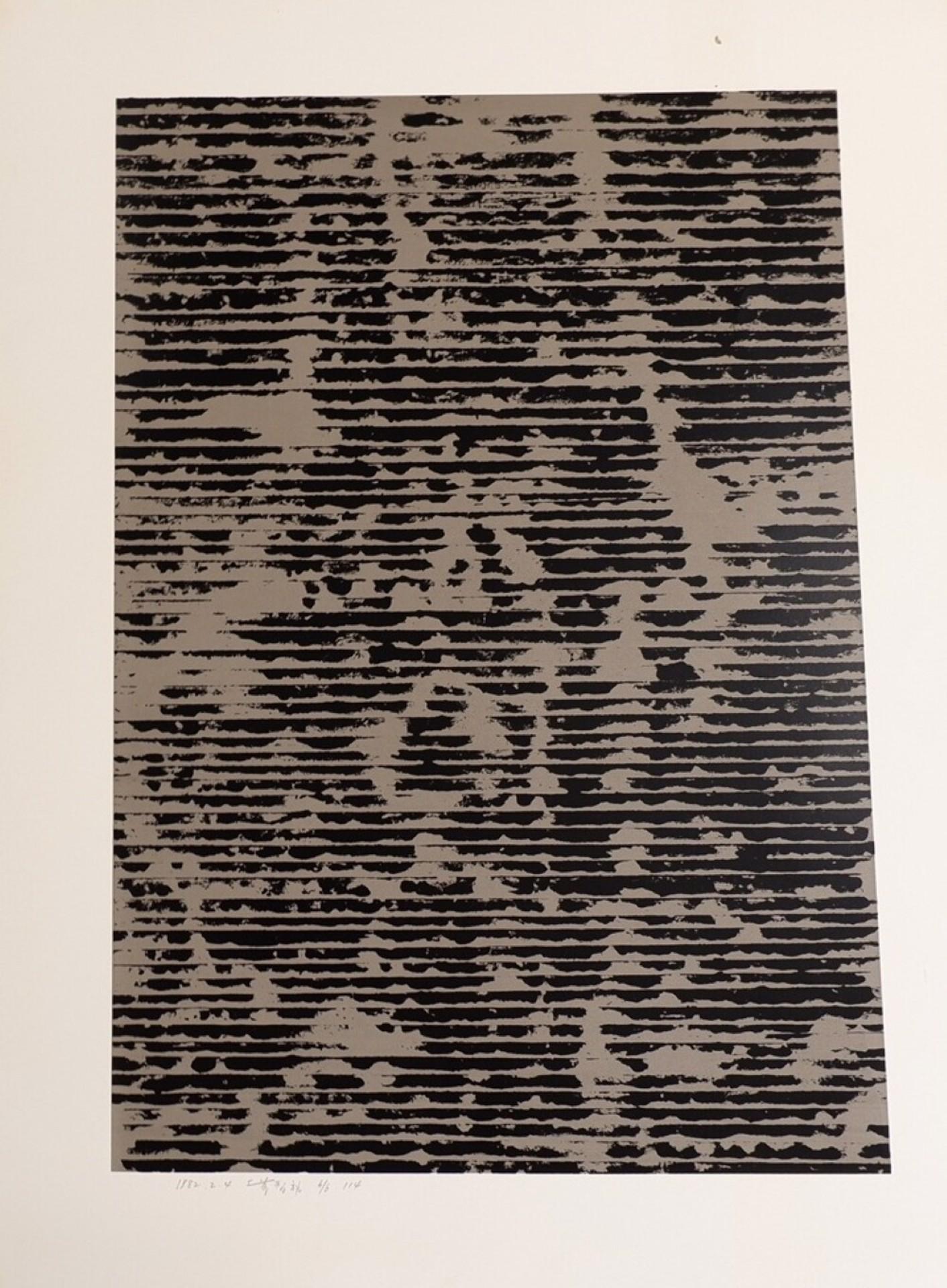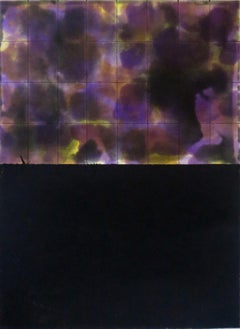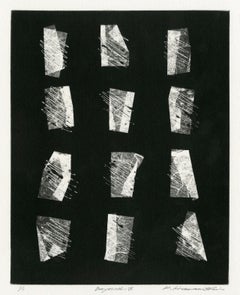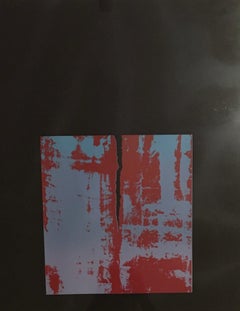Items Similar to Between Vertical and Horizon – Paper Between a Stone and Brook
Want more images or videos?
Request additional images or videos from the seller
1 of 11
Shoichi IdaBetween Vertical and Horizon – Paper Between a Stone and Brook1983
1983
$3,400
£2,594.29
€2,951.20
CA$4,774.70
A$5,225.34
CHF 2,761.13
MX$62,367.84
NOK 35,235.48
SEK 32,225.71
DKK 22,043.95
About the Item
Artist: Shoichi Ida (Japanese, 1941-2006)
Title: Surface is the Between – Between Vertical and Horizon – Paper Between a Stone and Brook
Series: Surface is the Between
Year: 1983
Medium: Lithograph, screen print, printed both sides with Chine-collé
Paper: Fabriano and Mino Usu Kozo
Image size: 35.55 x 25 inches
Sheet size: 37.5 x 27.75 inches
Signature: Signed lower right
Edition: 75. This one: 7/75
Condition: Very good
This print is by Shoichi Ida, a noted Japanese artist. It is from his extensive and important series titled “Surface is the Between’.
One of Ida Shōichi's (1941-2006) many prints, collages and sculptures that explore the physical space between objects that touch. Ida uses a hand-made translucent paper as his "between" and then creates his "surface" by printing a lithographic image on the verso and silkscreening a stone on the print's front side. This allows a pale image, really an illusion, of the print's title to emerge on the front side of the print.
The printing processes Ida uses are varied and complex. My description states that this print is “Lithograph, screen print, printed both sides with Chine-collé” That description is from the Museum of Contemporary Art, Tokyo. But I cannot vouch for the accuracy of that description of the medium because of the complexity and variety of techniques Ida uses in his creative process.
Ida began the Surface is Between series by printing on both side of the paper. This made the paper not only the meeting point of the two printed images, but, combined with the printed images, the work of art itself. In other words, it was no longer merely the substance onto which the image was transferred. The images are, however, very illusionary, as if Ida wanted to show the effects of natural phenomena without waiting for events to happen.
Shoichi Ida lived, worked and exhibited internationally throughout his career, He chose to remain in the traditional Japanese city of Kyoto where he was born in 1941. Among his many awards, in 1986 he and Robert Rauschenberg were presented with an Award For Excellence in International Cultural Exchange from the National Endowment for the Arts and in 1989 he was awarded the prestigious Suntory Prize in Japan. Ida's work is in the collections of over 80 international institutions including the National Museum of Modern Art in Kyoto, the National Museum of Modern Art in Tokyo, the Hara Museum of Contemporary Art in Tokyo, the Victoria and Albert Museum in London, the British Museum in London, the Museum of Modern Art in New York, the San Francisco Museum of Modern Art, the Smithsonian Institution Sackler Gallery in Washington DC and the Walker Art Center in Minneapolis.
Best known for his paper works and prints, Ida has worked with a variety of media from painting, drawing, ceramics, metal, stone and cloth to environmental and installation art
Ida's art involves a melding of Eastern traditions with a truth to materials common to Western Minimalism. The link between the two is nature. Ida has for many years worked on a series titled "Surface is the Between" which he explained in an interview published in the Hara Museum Review Spring 1987.
The "Surface" can be the paper or canvas or whatever, it is the point of contact between me and the ideas I am working on or the other materials I am working with. Or, an easier way to understand this might be to say that while we are talking now, there is a space between us where communication takes place. That space is important to appreciate — but you can't really see it, it's just air. You can't see the wind either, but if you look at the branches of a tree moving you can see the force of the wind. Through my work I try to make invisible phenomena visible by showing the point of contact.
- Creator:Shoichi Ida (1941 - 2006, Japanese)
- Creation Year:1983
- Dimensions:Height: 37.5 in (95.25 cm)Width: 27.75 in (70.49 cm)Depth: 0.1 in (2.54 mm)
- Medium:
- Movement & Style:
- Period:
- Condition:Very good condition.
- Gallery Location:San Francisco, CA
- Reference Number:Seller: PM08232025-11stDibs: LU666316827932
About the Seller
5.0
Platinum Seller
Premium sellers with a 4.7+ rating and 24-hour response times
Established in 1999
1stDibs seller since 2017
871 sales on 1stDibs
Typical response time: <1 hour
- ShippingRetrieving quote...Shipping from: San Francisco, CA
- Return Policy
More From This Seller
View All96-C-1
Located in San Francisco, CA
Artist: Yutaka Yoshinaga – Japanese (1948- )
Title: 96-C-1
Year: 1996
Medium: Color spit bite aquatint with drypoint and hard ground etching.
Image si...
Category
1990s Abstract Geometric Abstract Prints
Materials
Etching, Aquatint
Alternance
Located in San Francisco, CA
This artwork titled "Alternance" c.1980 is an original lithograph on Arches paper by noted French abstract expressionist artist Francois Rouan, b.1943. ...
Category
Late 20th Century Abstract Expressionist Abstract Prints
Materials
Lithograph
Untitled II
By Joseph Zirker
Located in San Francisco, CA
Artist: Joseph Zirker (American, born 1924)
Title: Untitled
Year: 1988
Medium: Color monotype
Paper: Arche 88
Size: 42 x 30 inches
Signature: Signed and dated in pencil by the artist
Printer: The artist
Condition: Very good
Frame: Unframed
About the artist.
Joseph Zirker is a noted American modern artist, educator, lecturer that was born on August 13, 1924 in Los Angeles, California, United States. As a young man he Served with United States Navy, from 1944 to 1946.
He attended the University of California in Los Angeles 1946—1947. He got a bachelor of Fine Arts at the University of Denver in 1949 and a master of Fine Arts, University Southern California, 1951.
He was a printer and research fellow at Tamarind Lithography Workshop in Los Angeles, 1961—1963. Lecturer University Southern California, 1963. Instructor Los Angeles County Art Institute, 1964, San Jose City College, California, 1966—1980.
Lecturer Stanford University, 1981—1983, 1986—1990. All along his carer, he had numerous acclaimed shows in the U.S and abroad. He is known worldwide as an innovator in monotype and printmaking. His works are represented in private and public collections, both in the USA and worldwide, including:
Grunwald Collection, U.C.L.A., Los Angeles, California,
Brooklyn Museum, Brooklyn, New York
Free Library of Philadelphia, Pennsylvania
June Wayne, Tamarind Lithography Workshop, Los Angeles, California
Tamarind Archives, Tamarind Lithography Workshop, Los Angeles, California,
Charles White, Los Angeles, California
Stanley Freeman Collection, Los Angeles County Museum, Los Angeles, California
Ben Smith...
Category
Late 20th Century American Modern Abstract Prints
Materials
Monotype
Untitled
By Ruth Leaf
Located in San Francisco, CA
This artwork "untitled" c.1990, is an original woodcut with embossing on thick Wove paper by noted American artist Ruth Leaf, 1923-2015. It is hand signed in pencil by the artist.. ...
Category
Late 20th Century Abstract Expressionist Abstract Prints
Materials
Woodcut
Untitled #1
Located in San Francisco, CA
This artwork, Untitled #1 is an original color aquatint on Wove paper by noted Mexican artist Luis Lopez Loza, b.1939. It is hand signed and numbered 4/50 i...
Category
Late 20th Century Abstract Abstract Prints
Materials
Aquatint
Alta Beach
Located in San Francisco, CA
This artwork titled "Alta Beach" c.1990 is an original lithograph with silver leaf addition on Arches paper, by Japanese artist Kenji Nanao, 1929-2013. It ...
Category
Late 20th Century Abstract Expressionist Abstract Prints
Materials
Mixed Media
You May Also Like
Untitled
By Shoichi Ida
Located in Fairlawn, OH
Untitled
molded mud-dried paper with collage elements, 1996
Signed and dated lower edge (see photo)
Annotated and titled verso
Sheet size: 24 x 7 inches
Provenance: Ralph Drake, fir...
Category
1990s Abstract Abstract Drawings and Watercolors
Materials
Mixed Media
Untitled
By Shoichi Ida
Located in Fairlawn, OH
Untitled
molded mud-dried paper with collage elements, 1996
Signed and dated lower edge (see photo)
Annotated and titled verso
Sheet size: 24 x 7 inches
Provenance: Ralph Drake, fir...
Category
1990s Abstract Abstract Drawings and Watercolors
Materials
Mixed Media
Beyound (sic) - IX
By Katsunori Hamanishi
Located in Fairlawn, OH
Beyond (sic) - IX
Mezzotint, n.d.
Signed, titled and numbered in pencil (see photos)
Edition: Unique impression (i/I)
Ninion and Sheldon Landy were major collectors of Hamanishi's works. They donated a large group of his mezzotints to Art Institute of Chicago, which formed the core of the exhibitions of his works at AIC in 2014 and again in 2019.
Condition: excellent
Plate/Image size: 9.75 x 7.75 inches
Sheet size: 12 1/2 x 9 5/8 inches
Provenance: Ninion and Sheldon Landy, Hamanishi's patrons
EXTREMELY RARE-UNIQUE
Katsunori Hamanishi
Born: 1949, Hokkaido
Medium: Mezzotint, with relief printing and metallic foil. Also a few woodblocks
Hamanishi studied painting and graduated from Tokai University with a degree in Art, in 1973. Since then, he has been living in the Tokyo area, where his primary focus is printmaking. Mezzotint is a variation of intaglio printing--an exacting and laborious process whereby ink is transferred from below the surface of the plate by use of a press. First, the entire copper plate is indented with a toothed steel rocker tool. Worked in all directions, this creates an even finely-grained texture over the surface of the plate. Each pit will hold ink and were the plate inked at this stage, it would print almost solid black.
To create the design the artist smoothes out some of the pits with a burnisher so they will hold less ink. Where highlights are required the plate is burnished and polished quite smooth. A wide range of tones are possible in mezzotint and the process can usually be recognized by a light design on a velvety black background. Hamanishi is internationally known for his mastery of this medium. He creates images with both subtle detail and dynamic composition that explore spatial relationships.
His genius is in balancing calm and meditative qualities with the energetic tensions of inanimate and natural objects. Early work had such things as pipes and branches wrapped with cloth, later rope, then straw. When he moved to a more rural area, rice fields became a common element. He has also been exploring the use of color and metallic leaf in his artwork. In 2005 Mr. Hamanishis began the Haze series exploring more abstract themes using the subtle differences between matte and black inks done in mezzotint and relief printing.
There is always a sense of mystery and intrigue in the complex mezzotint prints that come from Hamanishi’s deft hands. They compel the viewer to do a slow, thoughtful examination in order to fully absorb the vision the artist intends.
Exhibitions:
Worcester Art Museum, Massachusetts --2 person show with Hamaguchi
Ibiza Biennial, Spain--Grand Prize
Original Colored Graphic Print Triennial, Switzerland--Grand Prize
Cabo Frio International Print Biennial, Brazil--Grand Prize
CWAJ Print Show, Tokyo--Art Grant winner
Republic of China Print Exhibit--Gold Medal
Graphic Arts Council, Achenbach Foundation, San Francisco--commissioned print
Art Institute of Cleveland
University of Alberta, Edmonton, Canada--visiting artist
Shun-yo-Kai, Tokyo--prize winner
Bhara Bhavan International Print Biennale, India
Ren Brown...
Category
1980s Abstract Abstract Prints
Materials
Mezzotint
Abstract composition
Located in Genève, GE
Ed : 15/15
Work on paper
Brown wooden frame with glass pane
72 x 57 x 2.5 cm
Category
1970s Abstract Prints
Materials
Lithograph
Stones XXVIII (I) - 21st Century, Contemporary, Abstract Painting, Mixed Media
By Jon Errazu
Located in Barcelona, Catalonia
"My work is characterized by forms and lines. The relationship between background and figure is repeated persistently in each of my works. The figure, simple and almost always quadri...
Category
21st Century and Contemporary Contemporary Abstract Paintings
Materials
Canvas, Mixed Media
Untitled, 1982 Limited Edition of 6 by Chiyu Uemae, signed, dated and numbered
Located in Hong Kong, HK
Untitled (1982)
Screenprint on wove paper
Signed, dated and numbered by the artist.
Date: 1982 2 4
Ed. 6/6
50.9 x 34.6 cm (Image)
62.8 x 46.4 cm (Sheet)
This screenprint by Chiyu Ue...
Category
1980s Prints and Multiples
Materials
Screen


